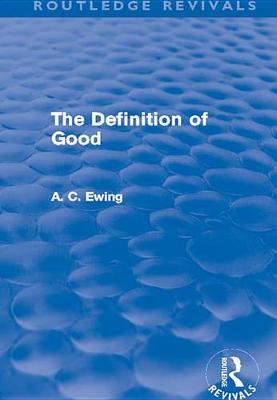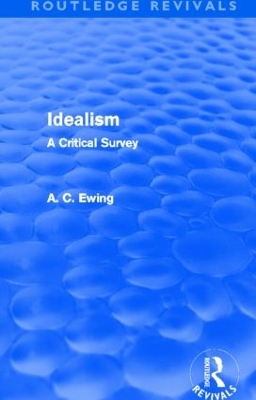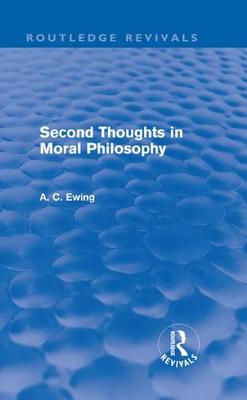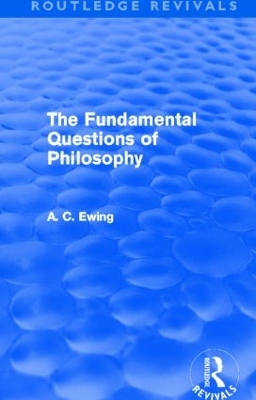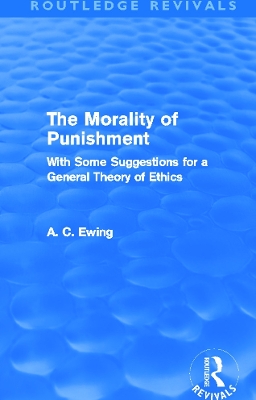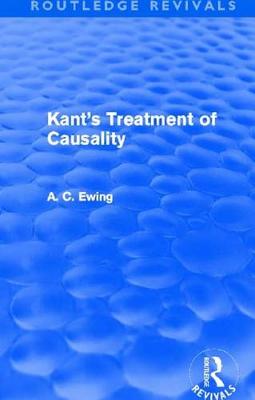Routledge Revivals
6 total works
First published in Great Britain in 1948, this book examines the definition of goodness as being distinct from the question of What things are good? Although less immediately and obviously practical, Dr. Ewing argues that the former question is more fundamental since it raises the issue of whether ethics is explicable wholly in terms of something else, for example, human psychology. Ewing states in his preface that the definition of goodness needs to be confirmed before one decides on the place value is to occupy in our conception of reality or on the ultimate characteristics which make one action right and another wrong. This book discusses these issues.
First published in 1934, this book evaluates the characteristic doctrines of the idealism which dominated philosophy during the last century. It seeks to combine realism, as to epistemology and physical objects, with a greater appreciation of views which emphasize the unity and rationality of the universe. This work is not a history and does not try to compete with any histories of idealism but it instead reaches an independent conclusion on certain philosophical problems by criticising what others have said. The book considers differing arguments in order to determine their validity.
First published in 1959, this volume follows on from Dr. A. C. Ewing's earlier work, The Definition of Good. The book does not apologize or undermine Ewing's previous publication but after further consideration on the topic, it explores the issues that were arguably overlooked in the original book. For example, it looks at the possibility of intermediate positions which have been developed since the philosophers Moore and Ross did their main work. Ewing also responds to the criticisms that originated from The Definition of Good and suggests that Secondary Thoughts in Moral Philosophy makes his reading on the topic more balanced.
The Fundamental Questions of Philosophy (Routledge Revivals)
by Alfred C Ewing
First Published in 1951, this outline work on the theory of knowledge and metaphysics is intended both for university students who have recently started on the subject and for any who, without having the advantage of studying it at university, wish by private reading to acquire a general idea of its nature.
The book deals with all the main questions arising within the field in so far as they can be stated and discussed profitably and simply. The topics discussed include the place of reason in knowledge and life, the possibility of knowledge beyond sense-experience, the theory of perception, the relation of body and mind, alleged philosophical implications of recent scientific doctrines, the problem of evil and the existence of God.
First published in 1929, this book explores the crucial, ethical question of the objects and the justification of punishment. Dr. A. C. Ewing considers both the retributive theory and the deterrent theory on the subject whilst remaining commendably unprejudiced. The book examines the views which emphasize the reformation of the offender and the education of the community as objects of punishment. It also deals with a theory of reward as a compliment to a theory of punishment.
Dr. Ewing's treatment of the topics is philosophical yet he takes in to account the practical considerations that should determine the nature and the amount of the punishment to be inflicted in different types of cases. This book will be of great interest to students of philosophy, teachers and those who are interested in the concrete problems of punishment by the state. It is an original contribution to the study of a subject of great theoretical and practical importance.
First published in 1924, this book examines one of the main philosophical debates of the period. Focusing on Kant's proof of causality, A.C. Ewing promotes its validity not only for the physical but also for the "psychological" sphere. The subject is of importance, for the problem of causality for Kant constituted the crucial test of his philosophy, the most significant of the Kantian categories. The author believes that Kant's statement of his proof, while too much bound up with other parts of his particular system of philosophy, may be restated "in a form which it can stand by itself and make a good claim for acceptance on all schools of thought".
